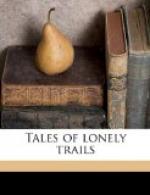Nielsen accompanied me on two trips into the wilderness of Arizona, on one of which he saved my life, and on the other he rescued all our party from a most uncomfortable and possibly hazardous situation—but these are tales I may tell elsewhere. In January 1919 Nielsen and I traveled around the desert of southern California from Palm Springs to Picacho, and in March we went to Death Valley.
Nowadays a little railroad, the Tonapah and Tidewater Railroad, runs northward from the Santa Fe over the barren Mojave, and it passes within fifty miles of Death Valley.
It was sunset when we arrived at Death Valley Junction—a weird, strange sunset in drooping curtains of transparent cloud, lighting up dark mountain ranges, some peaks of which were clear-cut and black against the sky, and others veiled in trailing storms, and still others white with snow. That night in the dingy little store I heard prospectors talk about float, which meant gold on the surface, and about high grade ores, zinc, copper, silver, lead, manganese, and about how borax was mined thirty years ago, and hauled out of Death Valley by teams of twenty mules. Next morning, while Nielsen packed the outfit, I visited the borax mill. It was the property of an English firm, and the work of hauling, grinding, roasting borax ore went on day and night. Inside it was as dusty and full of a powdery atmosphere as an old-fashioned flour mill. The ore was hauled by train from some twenty miles over toward the valley, and was dumped from a high trestle into shutes that fed the grinders. For an hour I watched this constant stream of borax as it slid down into the hungry crushers, and I listened to the chalk-faced operator who yelled in my ear. Once he picked a piece of gypsum out of the borax. He said the mill was getting out twenty-five hundred sacks a day. The most significant thing he said was that men did not last long at such labor, and in the mines six months appeared to be the limit of human endurance. How soon I had enough of that choking air in the room where the borax was ground! And the place where the borax was roasted in huge round revolving furnaces—I found that intolerable. When I got out into the cool clean desert air I felt an immeasurable relief. And that relief made me thoughtful of the lives of men who labored, who were chained by necessity, by duty or habit, or by love, to the hard tasks of the world. It did not seem fair. These laborers of the borax mines and mills, like the stokers of




